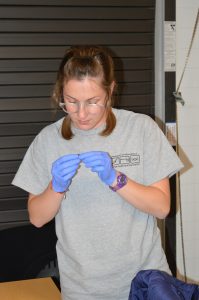The University of Indianapolis’ motto is “education for service.” For some students, these aspects of service include various volunteer opportunities and community involvement projects coordinated through the Volunteers in Service (VIS) program and the Center for Service-Learning and Community Engagement. For the Beyond Borders team, service means helping a community that is experiencing a mass disaster beyond belief. We take the knowledge and experience we have gained in the classroom and apply it in a real-world setting – identifying individuals who perished crossing the US-Mexico border in order to repatriate them back to their families. Applying my education in this type of setting is very different from merely learning and taking tests in school. In the classroom, I am surrounded by teachers and classmates that are at my beck and call for guidance when I have questions or need clarification. While Dr. Latham and my other team members are more than willing to help when I have questions, everyone is working on different tasks simultaneously which really pushes me to trust my knowledge, experience, and skill-set. It also teaches me to be independent while concurrently working as a member of a team that has a common goal.

At the end of each case, Dr. Latham checks all of the work we have done to make sure that our analyses were conducted properly. This allows for us as students to apply our education in a setting that is more independent than a classroom project, but is still checked and under the guidance of Dr. Latham. While this new-found independence is a little scary at first, it has allowed me to gain invaluable skills and experience that one simply cannot get in a classroom setting. I learn something new every time Dr. Latham checks our work, so this trip is an incredible learning experience for all of us and is morphing us into better scientists and forensic anthropologists in the process. I believe that this project truly exemplifies our school’s motto, and I am so thankful for the opportunity to be involved in this humanitarian effort in South Texas. Not only does it expose us to the crisis occurring at the border, it allows us to apply our education in a way that helps others and allows us to grow as individuals and as advocates for human rights.